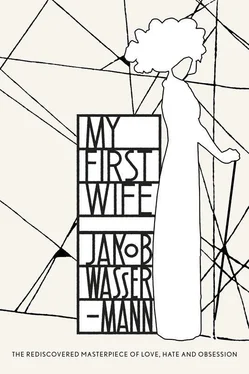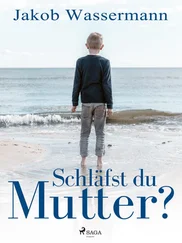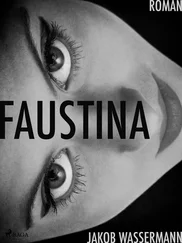In progressive, ‘zooming-in’ order, it seems to me that My First Wife has three distinct claims on our attention. It is, first and widest, a story of a rare intensity and drama. It is, second, a story set at a pivotal juncture in the long struggle between men and women — at the very moment of sorpasso , I would say. And, third, it is the story of a man of some eminence and gifts, trying to be unimpassioned and truthful about what he did and what was done to him. Let me go through these three layers, these three distances, in reverse order.
My First Wife is almost wholly true. Nothing of significance has been omitted. There was such a family as the Mevises in turn-of-the-century Vienna, descended from a wealthy German industrialist, with six daughters and a dominant professor father; they were the Speyers, and they were indeed known ‘all over town’; Julie Speyer was Ganna Mevis. In 1898, the then twenty-five-year-old Wassermann arrived in Vienna from Munich, following the publication of his first novel. He met Julie in circumstances like those related in the book (the agency of the well-meaning Frau von Brandeis), and the relationship developed, with Julie making the running, and Wassermann, as he relates, a mixture of awestruck, obliging, stoic and venal. The interview between Wassermann and his father-in-law passed off just as related. The wedding took place in January 1901. Honeymoon in Italy, pregnancy, return, shuttling around the Viennese suburbs — all as related. For three children, read four children (two boys and two girls — they were born in 1901 and 1903, 1906 and 1915). For meadow, read meadow. Ditto school foundation. For the extraordinary gift of a house on the edge of the city, read the extraordinary gift of a house on the edge of the city — and then, later, another one in the mountains, in Ebenweiler/Altaussee (for the generous Dutch businessman who couldn’t settle in the area, read Salomon Deventer). For sister-in-law Irmgard, read sister-in-law Agnes (though there seems little sense in disbelieving that there was an affair. Infidelities on Wassermann’s side were numerous, and — pace Herzog — not all that discreet).
Herzog’s confusion in face of the war was Wassermann’s. It was in 1915 that Wassermann first met Marta Karlweiss (Bettina Merck); by 1918 they were living together; in 1919 Wassermann finally asked for a divorce. Ganna writes an article about her husband; Julie a whole book: Jakob Wassermann und sein Werk (for his fiftieth birthday — 1923). She collects and publishes his letters; she collects and publishes his letters. The agonizingly slow separation, following a few summers in which Ganna and Bettina ‘shared’ Alexander in the country, was real. The seasonally/economically conditioned hopping from place to place in Ebenweiler/Altaussee was real. Wassermann and Marta moved into the newly offered villa in 1923; ‘little Caspar Hauser’ — his actual name was Carl Ulrich — was born in 1924. Protracted legal manoeuvrings found their — provisional — end in a — for Wassermann — staggering, ruinous divorce agreement as late as 1926. Nor was Julie done. In her maniacal possessiveness, she launched wave upon wave of proceedings (even at the time of Wassermann’s death, there were still cases pending). She wrote a roman à clef — Psyche Bleeds in the book, in actuality Das lebendige Herz: Roman einer Ehe ( The Living Heart: Novel of a Marriage ) — that came out in 1928. The blurb went like this:
With this work of fiction, the hitherto little known Viennese authoress quietly, nobly and authoritatively takes her place at the side of her former husband, Jakob Wassermann, his equal not least in her valiant endeavour to truthfully plumb the deeply tangled relations between two human beings. The Living Heart is a novel about the end of a writer’s marriage, of how — by ill luck, external circumstances and intrigues on the part of another woman — it was possible for a great man to become sundered from his family. In the midst of emotional storms, the character of the first wife attains an unforgettable scale.
Astonishingly, Julie thought the book would win him back. Lawyers — ‘thirty or forty lawyers’ — clustered in several countries, in several jurisdictions. The only satisfaction for the dying Wassermann was naming them for predatory or carnivorous birds: pelican, stork, crane and so forth.
I offered my sense that My First Wife is set at a pivotal moment in the relations between men and women. By this I mean not only that it is set in Vienna at the time of Freud, and that it plays in the decades either side of the First World War — the decades, if you will, of Women’s Suffrage — but also that it ends a certain kind of late-nineteenth-century male fantasy about women and society and money and art, namely that it was possible by adroit use of the last of these to make an impression on the first three. Originally, the idea — French, as all these things originally are — had been that there was an opposition, an enmity even, between the artist and his tasteless, foolish, moneyed public; the painter, the poet, the musician loathed and despised the bourgeois, and in return was maudit , ‘cursed’ for it. There was no niche for the artist in society and, if there was, he shouldn’t take it. His superiority, his aristocracy even, resided in his nerve endings. He was an outsider. As the nineteenth century turned into the twentieth, and the children of the bourgeoisie became cultivated and even a little neurasthenic themselves, there was finally some accommodation between the two. Each had something to offer the other, something to tempt him with. The bourgeois felt scandalous stirrings of a latent creativity, and the artist, tired of outlawry, a hankering for comfort and possessions.
Individual authors — like Dickens or Byron — may have come to money before, but Wassermann belonged to the first commercially successful generation ; they made writing look like a reasonable career option: Lion Feuchtwanger (1884–1958), Hugo von Hofmannsthal (1874–1929), Thomas Mann (1875–1955), Franz Werfel (1890–1945), Stefan Zweig (1881–1942), even Hermann Hesse (1877–1962), though his great success came later. The successful authors bought themselves imposing villas and cars (often more than one of each), kept secretaries and domestic staffs, holidayed exhaustively in the mountains or by the seaside, travelled the length and breadth of Europe and beyond, and thought of themselves as deserving members of the grande bourgeoisie. That is, they continued to lay claim to the inheritance of the French bohémiens , but in practical terms they expected a lifestyle of mahogany and silver and libraries. They demanded personal freedoms and the kudos of rebellion or unconventionality for themselves, but they also wanted presentable families (Thomas Mann’s pretty mob in sailor suits) and beetling castles or plush architect-designed homes (or, as was the case with Wassermann, both). The days of dying in garrets or taking one’s lobster for a walk were over. No, these writers were a startlingly worldly bunch. Stefan Zweig (who admittedly was born into a wealthy manufacturing family) owned Beethoven’s desk and Goethe’s pen and Leonardo and Mozart manuscripts, and lived, when he cared to, in a fourteenth-century bishop’s palace above Salzburg that his lovely and capable aristocratic wife had found for him; Thomas Mann was immortally described by Hermann Kesten as ‘ hartnäckiger Villenbesitze r’ (an obstinate or determined or serial owner of villas); while, sounding rather petulant in his almost fetishistic litany of aspirations, Hugo von Hofmannsthal (himself the son of a banker) wailed: ‘I finally want a house with Empire furniture, a smell of lavender, Old Vienna porcelain and music being played, where people can drop in, listen in silence, and maybe chat quietly, or not as the case may be.’
Читать дальше







![Jakob Wassermann - Issue Does Not Exist],errors:{](/books/585068/jakob-wassermann-issue-does-not-exist-errors-thumb.webp)




